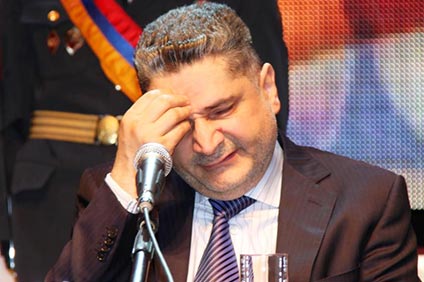Armenian government to complicate country’s dead-end situation

By Jamila Babayeva
The catastrophic demographic situation in Armenia has been officially confirmed.
"Armenia has a population of 2,871,771 people, while in 2001 the figure was 3 million 2 594 people. In other words, for ten years a resident population of Armenia has decreased by 130,823 people," the Armenian National Statistics Service reported.
Armenian media in turn believes that census data does not fully represent the actual number of residents.
"Given the current emigration rate one can guess the status of the population of Armenia. There is a joke in political circles that Levon Ter-Petrosyan was a president of four million citizens of Armenia, Robert Kocharyan reigned three million, while Serzh Sargsyan presides two million," the Armenian media reported.
Even those who return back to homeland from long emigration are also dissatisfied with their life in Yerevan. Talin Mkrtchyan returned back from Iran 10 years ago, but he is not happy with his life and complains of the violation of his rights.
"I am appealing to the Ministry of Diaspora," he said. "We face such problems that simply disappoint us. So, 150 families became homeless and are on the streets due to one individual," he said pointing on bank's fraud, which created problems related to rented apartments.
Public discontent is increasing, as well as the emigration of dissatisfied citizens, the head of Armenian Sociological Association Gevorg Pogosyan said.
"The government had many failures and ant explanation to the existing problems were insufficient. We are sitting on a social bomb, and if it explodes, it will hurt all of us. We do not want a blast, but all lead to this. Blast can occur very soon," he noted, calling the authorities to "detonate this bomb and talk to people".
Pogosyan believes that the opposition becomes more aggressive and civil society more decisive in Armenia. "The authorities will pursue more cautious policy if the people become stricter and more exacting," he added said.
Armenian Prime Minister Tigran Sargsyan confirmed that 2013 was difficult year for the country. "The government has done a lot to fulfill its promises. We will start the next year with a presentation of the priorities and we will have quite a stressful job. We should be able to fulfill our promises and commitments," he said at a final press-conference on December 27.
Sargsyan's first live press-conference was held in a very strange mood. "The meeting was convened at the level of editors, but most them were absent. A lot of students attended the meeting at the invitation of the government," Armenian media reported.
Sargsyan's statements gave to understand that Armenia is not sitting only on a social bomb, but also on an economic bomb.
Sargsyan recognized that Armenia has an oligopoly and small and medium-sized business does not improve. "Government's five-year program is doomed to fail unless Armenia creates a competitive environment," he said.
The World Bank's report on "Republic of Armenia. Accumulation, competition, cooperation" published in November 2013, noted that monopolies and oligopolies hold about 60-percent share in the Armenian market.
Armenia's Ministry of Economy reported that the share of small and medium-sized businesses in the structure of Armenian GDP was about 43 percent by the end of 2012, which has remained unchanged compared to 2011.
Sargsyan believes that Armenia will have a future as a state if the country does not form the way for the development of small and medium-sized businesses. "If we do not solve this problem, it will jeopardize our country's future," PM said.
He also recognized a decline in foreign investments. "The reason of the decline is the collapse of the construction industry. Prior to the crisis, investments to this sector were between $700 million to $1 billion a year, but fall in construction has led to a decline in investments," he said.
Sargsyan could not highlight on a direct question about the economic growth. "We will analyze the rate for 2013 and determine the areas with worse performance to figure out impediments on the achievement of high growth rates," he added.
Earlier Armenia's President Serzh Sargsyan instructed the government to ensure seven percent economic growth in 2013, and warned that otherwise the government should resign.
The government could not ensure any economic growth in the country by late 2013,but it is fully understandable on the background of high migration outflow and decline of foreign investments. And President Sargsyan seems not to hurry to demand the resignation of the government. The deepening economic slowdowns is sure to bring political crisis, which will inevitably complicate the country's dead-end situation.
Here we are to serve you with news right now. It does not cost much, but worth your attention.
Choose to support open, independent, quality journalism and subscribe on a monthly basis.
By subscribing to our online newspaper, you can have full digital access to all news, analysis, and much more.
You can also follow AzerNEWS on Twitter @AzerNewsAz or Facebook @AzerNewsNewspaper
Thank you!
